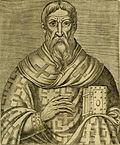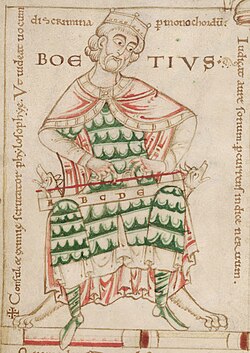The Dream of Scipio (Latin: Somnium Scipionis), written by Cicero, is the sixth book of De re publica, and describes a (postulated fictional or real)...
11 KB (1,180 words) - 07:52, 18 April 2025
of Scipio (Latin: Commentarii in Somnium Scipionis) is a philosophical treatise of Macrobius based on the famous dream narrated in On the republic of...
3 KB (292 words) - 17:23, 18 May 2025
Macrobius (category 5th-century writers in Latin)
the widely copied and read Commentarii in Somnium Scipionis ("Commentary on the Dream of Scipio") about Somnium Scipionis, which was one of the most important...
15 KB (1,757 words) - 13:50, 7 July 2025
On the Consolation of Philosophy (category 6th-century books in Latin)
Consolation, is a philosophical work by the Roman philosopher Boethius. Written in 523 while he was imprisoned and awaiting execution by the Ostrogothic King...
24 KB (2,713 words) - 14:36, 14 June 2025
De Coelesti Hierarchia (category Angels in Christianity)
the Celestial Hierarchy") is a Pseudo-Dionysian work on angelology, written in Greek and dated to ca. AD the 5th century; it exerted great influence on scholasticism...
2 KB (181 words) - 16:35, 26 April 2025
Ammonius Hermiae (category Roman-era students in Athens)
Hermias'; c. 440 – between 517 and 526) was a Greek philosopher from Alexandria in the eastern Roman empire during Late Antiquity. A Neoplatonist, he was the...
11 KB (1,171 words) - 05:08, 26 May 2025
Henology (category Concepts in ancient Greek metaphysics)
or discourse on the One that appears most notably in the philosophy of Plotinus. Henology stands in contradistinction to several other philosophical disciplines...
2 KB (188 words) - 17:16, 18 May 2025
Neoplatonism is a version of Platonic philosophy that emerged in the 3rd century AD against the background of Hellenistic philosophy and religion. The...
54 KB (6,756 words) - 11:40, 19 July 2025
Somnium Scipionis described a lengthy dream vision, which in turn was commented on by Macrobius in his Commentarii in Somnium Scipionis. Herodotus in...
80 KB (9,221 words) - 07:51, 19 July 2025
Near-Eastern thought. Porphyry edited the writings of Plotinus in fifty-four treatises, which vary greatly in length and number of chapters, mostly because he split...
14 KB (1,842 words) - 16:35, 26 April 2025
Theurgy (section In Western esotericism)
and in a word all the operations of divine possession." Keith Thomas: "Spiritual magic or theurgy was based on the idea that one could reach God in an...
11 KB (1,368 words) - 13:44, 14 April 2025
Martianus Capella (category 5th-century writers in Latin)
disciplinis ("On the seven disciplines"), is an elaborate didactic allegory written in a mixture of prose and elaborately allusive verse. Martianus often presents...
18 KB (2,174 words) - 17:31, 18 May 2025
Damascius (category Neoplatonists in Athens)
Scholasticus. Damascius, as his name suggests, was born in Damascus in c. 462 AD, and travelled to Alexandria in the 480s AD to study rhetoric at the coeducational...
21 KB (2,476 words) - 21:07, 20 June 2025
Medieval Islamic philosophy was steeped in both Aristotelianism and Neoplatonism from its ninth-century beginnings with al-Kindi, but the influence of...
3 KB (403 words) - 20:32, 3 June 2025
Anima mundi (category Articles lacking in-text citations from August 2024)
suggesting that the world is animated by a soul much like the human body. Rooted in ancient Greek and Roman philosophy, the idea holds that the world soul infuses...
33 KB (4,214 words) - 04:08, 26 May 2025
may have been in part compiled, in part received via trance, by Julian the Chaldean, or more likely, his son, Julian the Theurgist in the 2nd century...
13 KB (1,676 words) - 21:49, 29 May 2025
Emanationism (category Theories in ancient Greek philosophy)
Emanationism is a speculative theory in the cosmology or cosmogony of certain religious and philosophical systems, that posits the concept of emanation...
7 KB (860 words) - 17:14, 18 May 2025
himself in the corpus as "Dionysios", portraying himself as Dionysius the Areopagite, the Athenian convert of Paul the Apostle mentioned in Acts 17:34. In the...
46 KB (5,831 words) - 00:49, 21 May 2025
Allegorical interpretations of Plato (section Renewed dominance of the allegorical Plato in the Renaissance: Ficino)
symbols, or myths, that give the dialogues layers of figurative meaning in addition to their usual literal meaning. These allegorical interpretations...
55 KB (7,421 words) - 17:17, 18 May 2025
Boethius (category 6th-century writers in Latin)
historian, and philosopher of the Early Middle Ages. He was a central figure in the translation of the Greek classics into Latin, a precursor to the Scholastic...
65 KB (7,439 words) - 05:12, 1 July 2025
a philosophical work composed in Arabic in the 9th century. It was once attributed to Aristotle and became popular in West during the Middle Ages, after...
9 KB (1,027 words) - 12:35, 7 May 2025
Porphyrian tree (category Concepts in logic)
In philosophy (particularly the theory of categories), the Porphyrian tree (also spelled Porphyrean tree) or Tree of Porphyry is a classic device for illustrating...
11 KB (1,342 words) - 12:41, 16 July 2025
Giovanni Pico della Mirandola (category 15th-century writers in Latin)
had long dwelt in the Castle of Mirandola (Duchy of Modena), which had become independent in the fourteenth century and had received in 1414 from the Holy...
44 KB (5,558 words) - 09:06, 14 July 2025
Iamblichus (category Articles lacking in-text citations from November 2021)
Iamblichus' biographer, Eunapius, Iamblichus was born in Chalcis (later called Qinnašrīn) in Coele, now in northwest Syria. Iamblichus was descended from the...
19 KB (1,895 words) - 20:58, 1 June 2025
Henosis (redirect from Mysticism in Neoplatonism)
precedents in the Greek mystery religions as well as parallels in Eastern philosophy. It is further developed in the Corpus Hermeticum, in Christian theology...
10 KB (1,283 words) - 09:17, 1 June 2025
Hypostasis (philosophy and religion) (category Concepts in ancient Greek metaphysics)
substance.[citation needed] In Neoplatonism, the hypostasis of the soul, the intellect (nous) and "the one" was addressed by Plotinus. In Christian theology,...
34 KB (4,446 words) - 21:03, 27 July 2025
Okhema (category Concepts in ancient Greek philosophy of mind)
tês psukhês), serving as the intermediary between the body and the soul, in Neoplatonism and the philosophical traditions it influenced. Neoplatonism...
4 KB (372 words) - 05:51, 5 May 2025
Plotinus (category Roman-era philosophers in Rome)
Plōtînos; c. 204/5 – 270 CE) was a Greek Platonist philosopher, born and raised in Roman Egypt. Plotinus is regarded by modern scholarship as the founder of...
69 KB (8,804 words) - 23:08, 6 July 2025
/ˈaɪsəɡoʊdʒiː/) or "Introduction" to Aristotle's "Categories", written by Porphyry in Greek and translated into Latin by Boethius, was the standard textbook on...
7 KB (750 words) - 17:21, 18 May 2025
Proclus (category Neoplatonists in Athens)
in 412 AD in Constantinople to a family of high social status from Lycia, and raised in Xanthus. He studied rhetoric, philosophy and mathematics in Alexandria...
28 KB (3,295 words) - 19:38, 7 June 2025
















